新目标浙江中考英语二轮复习语法篇--动词的时态和语态(共24张PPT)
文档属性
| 名称 | 新目标浙江中考英语二轮复习语法篇--动词的时态和语态(共24张PPT) |  | |
| 格式 | pptx | ||
| 文件大小 | 2.4MB | ||
| 资源类型 | 试卷 | ||
| 版本资源 | 人教新目标(Go for it)版 | ||
| 科目 | 英语 | ||
| 更新时间 | 2021-05-25 14:45:12 | ||
图片预览

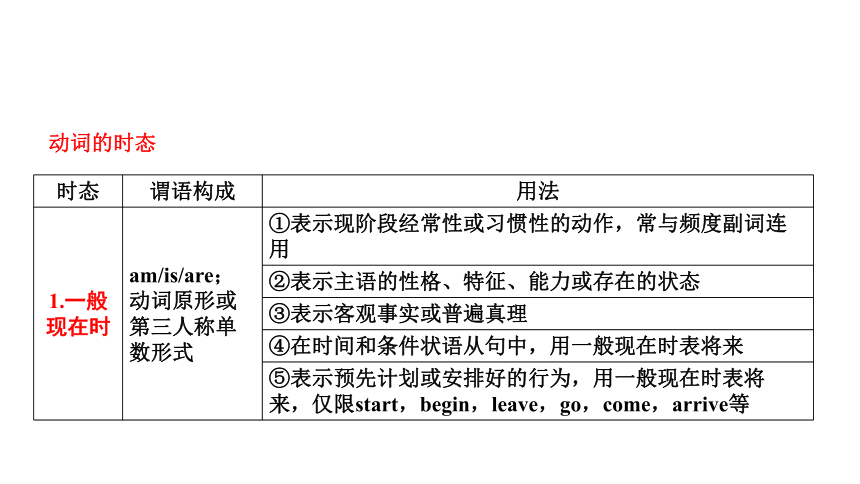
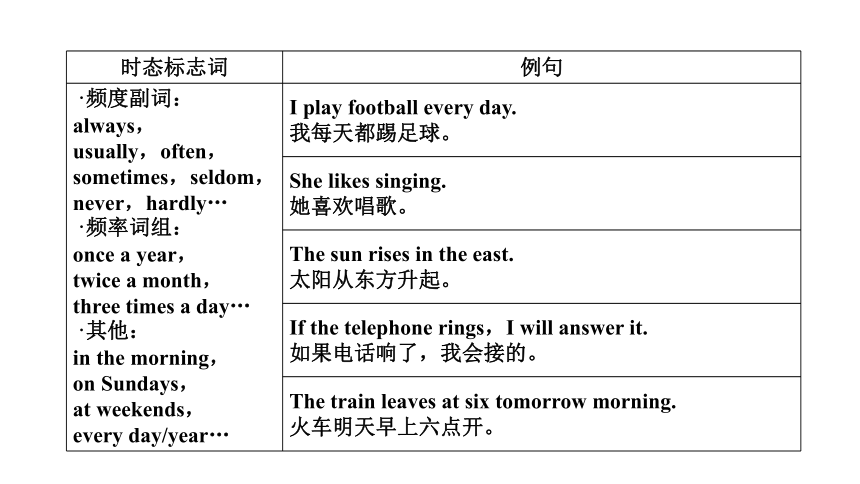
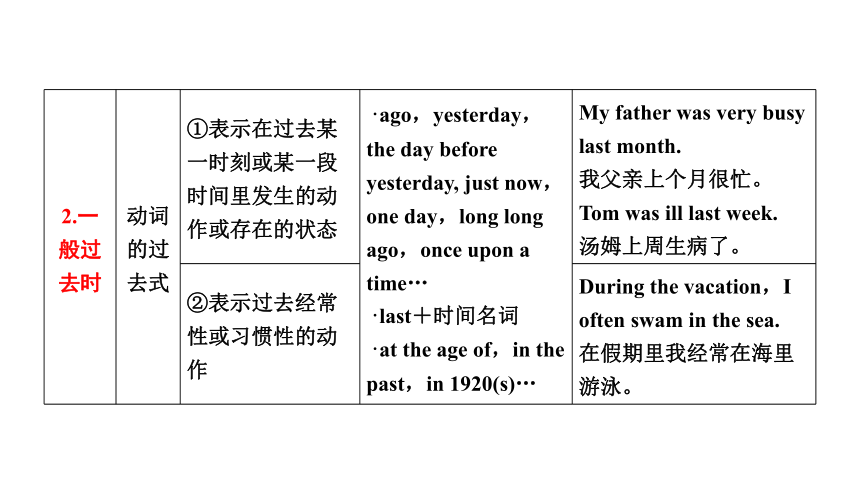
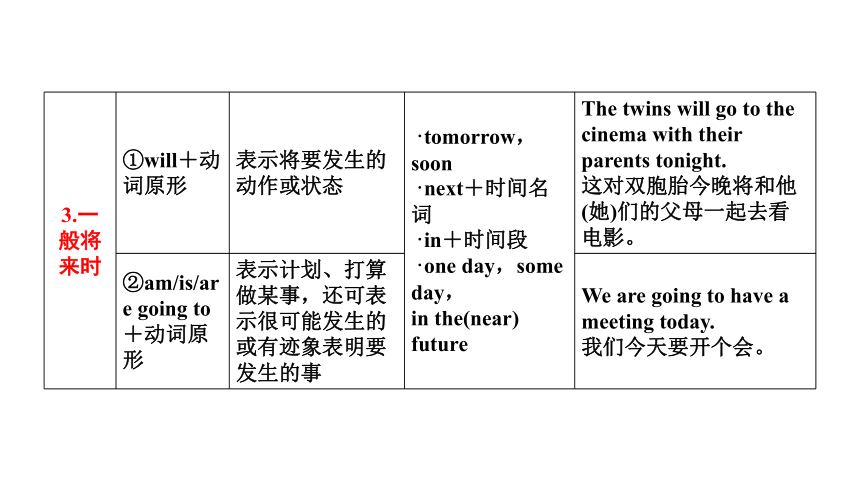
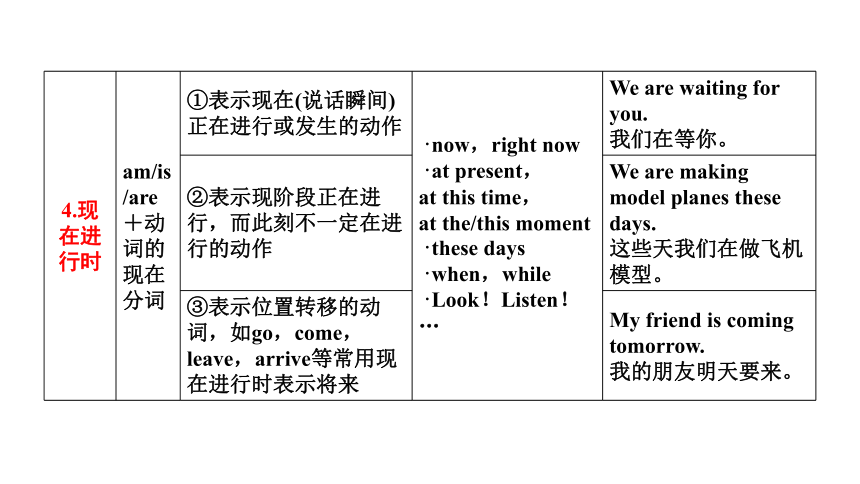
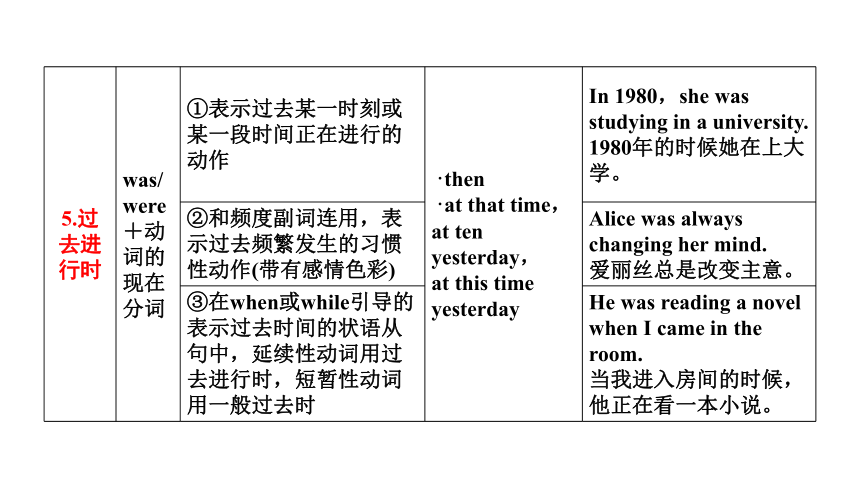
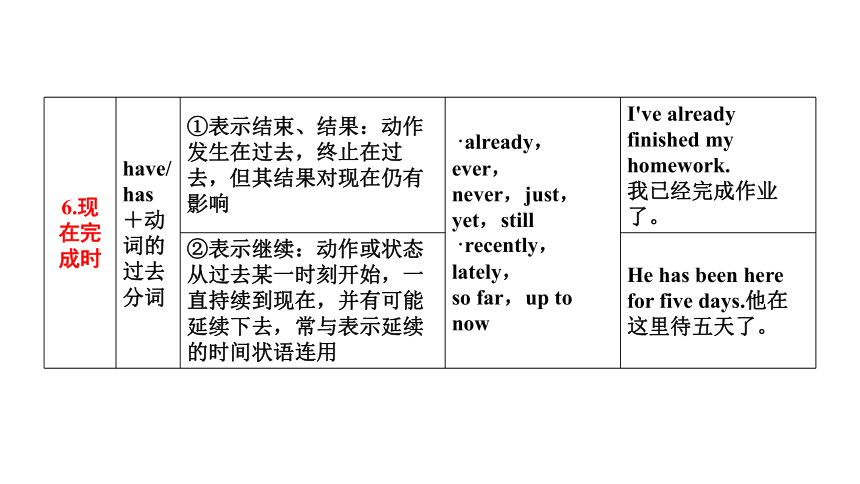
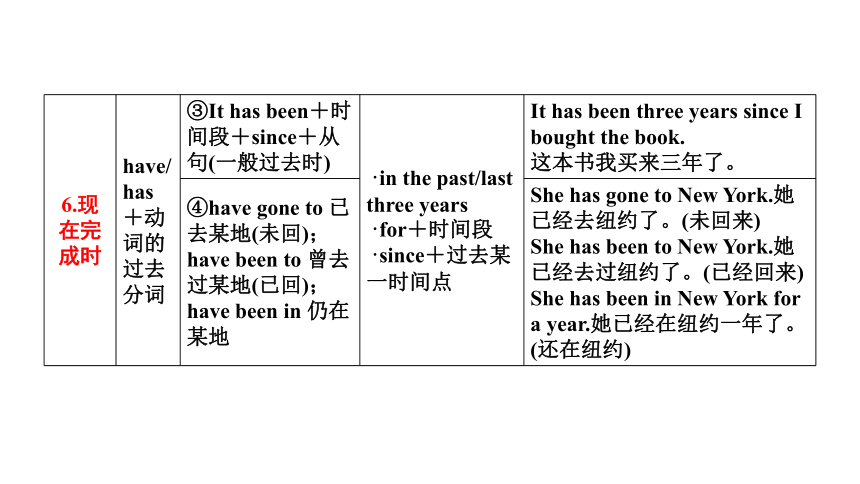
文档简介
中考二轮复习
语法篇
动词的时态和语态
时态
谓语构成
用法
1.一般现在时
am/is/are;
动词原形或第三人称单数形式
①表示现阶段经常性或习惯性的动作,常与频度副词连用
②表示主语的性格、特征、能力或存在的状态
③表示客观事实或普遍真理
④在时间和条件状语从句中,用一般现在时表将来
⑤表示预先计划或安排好的行为,用一般现在时表将
来,仅限start,begin,leave,go,come,arrive等
动词的时态
时态标志词
例句
·频度副词:
always,
usually,often,
sometimes,seldom,
never,hardly…
·频率词组:
once a year,
twice a month,
three times a day…
·其他:
in the morning,
on Sundays,
at weekends,
every day/year…
I play football every day.
我每天都踢足球。
She likes singing.
她喜欢唱歌。
The sun rises in the east.
太阳从东方升起。
If the telephone rings,I will answer it.
如果电话响了,我会接的。
The train leaves at six tomorrow morning.
火车明天早上六点开。
2.一般过去时
动词的过去式
①表示在过去某一时刻或某一段时间里发生的动作或存在的状态
·ago,yesterday,the day before yesterday, just now,one day,long long ago,once upon a time…
·last+时间名词
·at the age of,in the past,in 1920(s)…
My father was very busy last month.
我父亲上个月很忙。
Tom was ill last week.
汤姆上周生病了。
②表示过去经常性或习惯性的动作
During the vacation,I often swam in the sea.
在假期里我经常在海里游泳。
3.一般将来时
①will+动词原形
表示将要发生的动作或状态
·tomorrow,soon
·next+时间名词
·in+时间段
·one day,some day,
in the(near) future
The twins will go to the cinema with their parents tonight.
这对双胞胎今晚将和他
(她)们的父母一起去看电影。
②am/is/are going to+动词原形
表示计划、打算做某事,还可表示很可能发生的或有迹象表明要发生的事
We are going to have a meeting today.
我们今天要开个会。
4.现在进行时
am/is/are+动词的现在分词
①表示现在(说话瞬间)正在进行或发生的动作
·now,right now
·at present,
at this time,
at the/this moment
·these days
·when,while
·Look!Listen!…
We are waiting for you.
我们在等你。
②表示现阶段正在进
行,而此刻不一定在进行的动作
We are making model planes these days.
这些天我们在做飞机模型。
③表示位置转移的动
词,如go,come,leave,arrive等常用现在进行时表示将来
My friend is coming tomorrow.
我的朋友明天要来。
5.过去进行时
was/were+动词的现在分词
①表示过去某一时刻或某一段时间正在进行的动作
·then
·at that time,
at ten yesterday,
at this time yesterday
In 1980,she was studying in a university.
1980年的时候她在上大学。
②和频度副词连用,表示过去频繁发生的习惯性动作(带有感彩)
Alice was always changing her mind.
爱丽丝总是改变主意。
③在when或while引导的表示过去时间的状语从句中,延续性动词用过去进行时,短暂性动词用一般过去时
He was reading a novel when I came in the room.
当我进入房间的时候,他正在看一本小说。
6.现在完成时
have/has+动词的过去分词
①表示结束、结果:动作发生在过去,终止在过
去,但其结果对现在仍有影响
·already,
ever,
never,just,
yet,still
·recently,
lately,
so far,up to now
I've already finished my homework.
我已经完成作业
了。
②表示继续:动作或状态从过去某一时刻开始,一直持续到现在,并有可能延续下去,常与表示延续的时间状语连用
He has been here for five days.他在这里待五天了。
6.现在完成时
have/has+动词的过去分词
③It has been+时间段+since+从句(一般过去时)
·in the past/last three years
·for+时间段
·since+过去某一时间点
It has been three years since I bought the book.
这本书我买来三年了。
④have gone to 已去某地(未回);have been to 曾去过某地(已回);have been in 仍在某地
She has gone to New York.她已经去纽约了。(未回来)
She has been to New York.她已经去过纽约了。(已经回来)
She has been in New York for a year.她已经在纽约一年了。(还在纽约)
7.过去完成时
had+动词的过去分词
表示在过去某一时间或动作之前已经发生或完成了的动作,常用于宾语从句中
He told me that he had learned 5,000 words before he entered the university.
他告诉我他在进大学之前已经学了5000个单词。
8.过去将来时
①would+动词原形
表示从过去的某一时刻来看将要发生的动作,多用于宾语从句和间接引语中
She said that she wouldn't do that again.
她说她再也不会这样做了。
②was/were going to+动词原形
表示曾经打算或准备要做某事
I was going to tell you everything yesterday.
我昨天本想告诉你所有事。
在现在完成时中,短暂性动词不能与表示一段时间的短语连用,需要用延续性动词或表示状态的词来替换。如:
He has joined the army for three years.(×)He has been a soldier for three years.(√)
他参军已经三年了。
常见的短暂性动词及其转换词:
become→have been borrow→have kept buy→have had
come→have been in join→have been in begin/start→have been on
stop→have been over leave→have been away open→have been open
close→have been closed lose→have been lost marry→have been married
die→have been dead break→have been broken get up→have been up
注意
stuck
support
has helped
is doing
treats
would be
was sitting
have learnt/learned
will have
动词的语态
1.常考被动语态的构成
①一般现在时
am/is/are+done
如:Football is played in most countries in the world.世界上大多数国家都踢足球。
②一般过去时
was/were+done
如:My bike was stolen last night.
我的自行车昨晚被偷了。
③一般将来时
will/shall be+done
如:The new film will be shown next Thursday.这部新电影将在下周四上映。
④含情态动词
情态动词+be+done
如:The environment should be improved.
环境应当得到改善。
⑤现在完成时※
have/has been+done
如:The problem has been discussed for two days.这个问题已经讨论了两天了。
2.常见被动语态的用法
①不知道动作的执行者是谁
如:The bridge was built in 1980.
这座桥建于1980年。
②没有必要指出动作的执行者
如:Many trees should be planted every year.
每年都应该种很多树。
③需要强调和突出动作的承受者
如:The flight had been canceled before we arrived.
在我们到达之前,航班已经被取消了。
④句子的主语是物
如:Many houses were washed away by the flood.许多房屋被洪水冲走了。
3.主动语态变被动语态
巧记:宾变主,主变宾,谓语动词用被
动。
4.主动形式表示被动意义※
①系动词+形容词/名词
系动词包括:look,feel,sound,smell,taste,
seem,appear,go,turn等
如:The dish smells nice.
这道菜闻起来很香。
②某些动词+副词well,easily,badly,smoothly等
动词包括:read,write,
act,cut,wash,clean,
draw,sell,lock,cook等
如:The cloth washes easily.
这种布容易清洗。
The pen writes fluently.
这支笔写起来流畅。
③表示开始或结束的词
此类词包括:begin,start,finish,open,close,stop等
如:Work began at 7 o'clock this morning.上午七点开始工作。
④其他结构
·need/require/want+doing sth.
·be worth doing sth.
如:The desk needs repairing.
这张课桌需要修理。
The book is worth reading.
这本书值得一读。
5.不能使用被动语态的情况※
①不及物动词(短语)没有被动语态
此类常见词包括:happen,take place,belong to等
如:The accident happened last night.
事故发生在昨晚。
②表示状态的动词没有被动语态
此类常见词包括:have,own,fail,cost,last(持续)等
如:The trousers fit me well.
这条裤子很适合我。
1.“使役动词”和“感官动词”后接不带to的动词不定式作补语时,变被动语态时要还原to
此类常见词归纳:
一感(feel)
二听(hear/listen)
三使(make/have/let)
四看(look/see/watch/notice)
如:I heard Amy sing that morning.
那天早上我听到Amy在唱歌。
→Amy was heard to sing that morning.
那天早上Amy被听到在唱歌。
注意
2.带有双宾语的动词变为被动语态有两种方法
此类常见词包括:give,buy,sell,take,bring,make,hand,pass,
keep,send等
如:He gave the girl a toy.
他给了这个女孩一个玩具。
→The girl was given a toy.
这个女孩被分到一个玩具。
→A toy was given to the girl.
一个玩具被分给这个女孩。
3.动词短语变被动语态时,不要丢掉动词后面的介词或副词
如:Mary looks after the children carefully.
玛丽很细致地照顾这些孩子。
→The children are looked after(by Mary)carefully.
这些孩子被(玛丽)细致地照顾着。
is loved
are made
be punished
were planted
will be completed
should
be
spoken
to
was
given
was
given
to
am
made
to
do
https://www.21cnjy.com/help/help_extract.php
语法篇
动词的时态和语态
时态
谓语构成
用法
1.一般现在时
am/is/are;
动词原形或第三人称单数形式
①表示现阶段经常性或习惯性的动作,常与频度副词连用
②表示主语的性格、特征、能力或存在的状态
③表示客观事实或普遍真理
④在时间和条件状语从句中,用一般现在时表将来
⑤表示预先计划或安排好的行为,用一般现在时表将
来,仅限start,begin,leave,go,come,arrive等
动词的时态
时态标志词
例句
·频度副词:
always,
usually,often,
sometimes,seldom,
never,hardly…
·频率词组:
once a year,
twice a month,
three times a day…
·其他:
in the morning,
on Sundays,
at weekends,
every day/year…
I play football every day.
我每天都踢足球。
She likes singing.
她喜欢唱歌。
The sun rises in the east.
太阳从东方升起。
If the telephone rings,I will answer it.
如果电话响了,我会接的。
The train leaves at six tomorrow morning.
火车明天早上六点开。
2.一般过去时
动词的过去式
①表示在过去某一时刻或某一段时间里发生的动作或存在的状态
·ago,yesterday,the day before yesterday, just now,one day,long long ago,once upon a time…
·last+时间名词
·at the age of,in the past,in 1920(s)…
My father was very busy last month.
我父亲上个月很忙。
Tom was ill last week.
汤姆上周生病了。
②表示过去经常性或习惯性的动作
During the vacation,I often swam in the sea.
在假期里我经常在海里游泳。
3.一般将来时
①will+动词原形
表示将要发生的动作或状态
·tomorrow,soon
·next+时间名词
·in+时间段
·one day,some day,
in the(near) future
The twins will go to the cinema with their parents tonight.
这对双胞胎今晚将和他
(她)们的父母一起去看电影。
②am/is/are going to+动词原形
表示计划、打算做某事,还可表示很可能发生的或有迹象表明要发生的事
We are going to have a meeting today.
我们今天要开个会。
4.现在进行时
am/is/are+动词的现在分词
①表示现在(说话瞬间)正在进行或发生的动作
·now,right now
·at present,
at this time,
at the/this moment
·these days
·when,while
·Look!Listen!…
We are waiting for you.
我们在等你。
②表示现阶段正在进
行,而此刻不一定在进行的动作
We are making model planes these days.
这些天我们在做飞机模型。
③表示位置转移的动
词,如go,come,leave,arrive等常用现在进行时表示将来
My friend is coming tomorrow.
我的朋友明天要来。
5.过去进行时
was/were+动词的现在分词
①表示过去某一时刻或某一段时间正在进行的动作
·then
·at that time,
at ten yesterday,
at this time yesterday
In 1980,she was studying in a university.
1980年的时候她在上大学。
②和频度副词连用,表示过去频繁发生的习惯性动作(带有感彩)
Alice was always changing her mind.
爱丽丝总是改变主意。
③在when或while引导的表示过去时间的状语从句中,延续性动词用过去进行时,短暂性动词用一般过去时
He was reading a novel when I came in the room.
当我进入房间的时候,他正在看一本小说。
6.现在完成时
have/has+动词的过去分词
①表示结束、结果:动作发生在过去,终止在过
去,但其结果对现在仍有影响
·already,
ever,
never,just,
yet,still
·recently,
lately,
so far,up to now
I've already finished my homework.
我已经完成作业
了。
②表示继续:动作或状态从过去某一时刻开始,一直持续到现在,并有可能延续下去,常与表示延续的时间状语连用
He has been here for five days.他在这里待五天了。
6.现在完成时
have/has+动词的过去分词
③It has been+时间段+since+从句(一般过去时)
·in the past/last three years
·for+时间段
·since+过去某一时间点
It has been three years since I bought the book.
这本书我买来三年了。
④have gone to 已去某地(未回);have been to 曾去过某地(已回);have been in 仍在某地
She has gone to New York.她已经去纽约了。(未回来)
She has been to New York.她已经去过纽约了。(已经回来)
She has been in New York for a year.她已经在纽约一年了。(还在纽约)
7.过去完成时
had+动词的过去分词
表示在过去某一时间或动作之前已经发生或完成了的动作,常用于宾语从句中
He told me that he had learned 5,000 words before he entered the university.
他告诉我他在进大学之前已经学了5000个单词。
8.过去将来时
①would+动词原形
表示从过去的某一时刻来看将要发生的动作,多用于宾语从句和间接引语中
She said that she wouldn't do that again.
她说她再也不会这样做了。
②was/were going to+动词原形
表示曾经打算或准备要做某事
I was going to tell you everything yesterday.
我昨天本想告诉你所有事。
在现在完成时中,短暂性动词不能与表示一段时间的短语连用,需要用延续性动词或表示状态的词来替换。如:
He has joined the army for three years.(×)He has been a soldier for three years.(√)
他参军已经三年了。
常见的短暂性动词及其转换词:
become→have been borrow→have kept buy→have had
come→have been in join→have been in begin/start→have been on
stop→have been over leave→have been away open→have been open
close→have been closed lose→have been lost marry→have been married
die→have been dead break→have been broken get up→have been up
注意
stuck
support
has helped
is doing
treats
would be
was sitting
have learnt/learned
will have
动词的语态
1.常考被动语态的构成
①一般现在时
am/is/are+done
如:Football is played in most countries in the world.世界上大多数国家都踢足球。
②一般过去时
was/were+done
如:My bike was stolen last night.
我的自行车昨晚被偷了。
③一般将来时
will/shall be+done
如:The new film will be shown next Thursday.这部新电影将在下周四上映。
④含情态动词
情态动词+be+done
如:The environment should be improved.
环境应当得到改善。
⑤现在完成时※
have/has been+done
如:The problem has been discussed for two days.这个问题已经讨论了两天了。
2.常见被动语态的用法
①不知道动作的执行者是谁
如:The bridge was built in 1980.
这座桥建于1980年。
②没有必要指出动作的执行者
如:Many trees should be planted every year.
每年都应该种很多树。
③需要强调和突出动作的承受者
如:The flight had been canceled before we arrived.
在我们到达之前,航班已经被取消了。
④句子的主语是物
如:Many houses were washed away by the flood.许多房屋被洪水冲走了。
3.主动语态变被动语态
巧记:宾变主,主变宾,谓语动词用被
动。
4.主动形式表示被动意义※
①系动词+形容词/名词
系动词包括:look,feel,sound,smell,taste,
seem,appear,go,turn等
如:The dish smells nice.
这道菜闻起来很香。
②某些动词+副词well,easily,badly,smoothly等
动词包括:read,write,
act,cut,wash,clean,
draw,sell,lock,cook等
如:The cloth washes easily.
这种布容易清洗。
The pen writes fluently.
这支笔写起来流畅。
③表示开始或结束的词
此类词包括:begin,start,finish,open,close,stop等
如:Work began at 7 o'clock this morning.上午七点开始工作。
④其他结构
·need/require/want+doing sth.
·be worth doing sth.
如:The desk needs repairing.
这张课桌需要修理。
The book is worth reading.
这本书值得一读。
5.不能使用被动语态的情况※
①不及物动词(短语)没有被动语态
此类常见词包括:happen,take place,belong to等
如:The accident happened last night.
事故发生在昨晚。
②表示状态的动词没有被动语态
此类常见词包括:have,own,fail,cost,last(持续)等
如:The trousers fit me well.
这条裤子很适合我。
1.“使役动词”和“感官动词”后接不带to的动词不定式作补语时,变被动语态时要还原to
此类常见词归纳:
一感(feel)
二听(hear/listen)
三使(make/have/let)
四看(look/see/watch/notice)
如:I heard Amy sing that morning.
那天早上我听到Amy在唱歌。
→Amy was heard to sing that morning.
那天早上Amy被听到在唱歌。
注意
2.带有双宾语的动词变为被动语态有两种方法
此类常见词包括:give,buy,sell,take,bring,make,hand,pass,
keep,send等
如:He gave the girl a toy.
他给了这个女孩一个玩具。
→The girl was given a toy.
这个女孩被分到一个玩具。
→A toy was given to the girl.
一个玩具被分给这个女孩。
3.动词短语变被动语态时,不要丢掉动词后面的介词或副词
如:Mary looks after the children carefully.
玛丽很细致地照顾这些孩子。
→The children are looked after(by Mary)carefully.
这些孩子被(玛丽)细致地照顾着。
is loved
are made
be punished
were planted
will be completed
should
be
spoken
to
was
given
was
given
to
am
made
to
do
https://www.21cnjy.com/help/help_extract.php
同课章节目录
- 词法
- 名词
- 动词和动词短语
- 动词语态
- 动词时态
- 助动词和情态动词
- 非谓语动词
- 冠词
- 代词
- 数词和量词
- 形容词副词及其比较等级
- 介词和介词短语
- 连词和感叹词
- 构词法
- 相似、相近词比较
- 句法
- 陈述句
- 一般疑问句和否定疑问句
- 特殊疑问句及选择疑问句
- 反意疑问句
- 存在句(There be句型)
- 宾语从句
- 定语从句
- 状语从句
- 主谓一致问题
- 简单句
- 并列句
- 复合句
- 主谓一致
- 主、表语从句
- 名词性从句
- 直接引语和间接引语
- 虚拟语气
- 感叹句
- 强调句
- 倒装句
- 祈使句
- 句子的成分
- 句子的分类
- 题型专区
- 单项选择部分
- 易错题
- 完形填空
- 阅读理解
- 词汇练习
- 听说训练
- 句型转换
- 补全对话
- 短文改错
- 翻译
- 书面表达
- 任务型阅读
- 语法填空
- 其他资料
